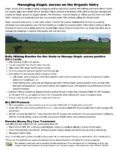The educational materials listed on this page are about Organic Agriculture.
Organic agriculture integrates “cultural, biological and mechanical practices that foster cycling of resources, promote ecological balance, and conserve biodiversity.” Organic and sustainable agriculture often include the use of cover crops, crop rotation, use of tools and machinery for weed and pest management, and conservation tillage. Synthetic fertilizers, sewage sludge, irradiation and genetic engineering may not be used for food to be certified and labelled USDA organic. Organic livestock must have access to the outdoors and be “fed 100 percent certified organic feed, managed without antibiotics, added growth hormones, mammalian or avian byproducts, or other prohibited feed ingredients.” SARE has many helpful reads including Transitioning to Organic Production, which addresses conversion strategies, organic farming production practices, marketing approaches and federal organic standards for certified organic crop and livestock. SARE’s Crop Rotation on Organic Farms reviews how rotating crops improve soil quality and health and help manage pests, diseases, and weeds.
Showing 1-2 of 2 results
How Alive is My Soil?
This guide presents soil testing methods that can be performed in the field by farmers, gardeners, or anyone who desires to understand and appreciate soil from a different perspective. While these tests aren’t intended to be a replacement for sending soil to a lab, they can be considered complementary to annual or biannual lab analysis.

Managing Staph aureus on the Organic Dairy
Staphylococcus aureus is a bacterium that causes mastitis in dairy cattle. Staph aureus mastitis is highly contagious and can easily spread among the herd. Organic dairy farmer Katie Webb Clark conducted a Northeast SARE Farmer Grant project to test milking hygiene and preventative management protocols used in the U.S. and New Zealand, trialed Manuka honey […]